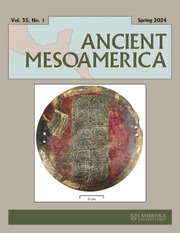Crossref Citations
This article has been cited by the following publications. This list is generated based on data provided by
Crossref.
Quintanilla, Alejandra García
2005.
SAAK'Y EL RETORNO DEL FIN DEL MUNDO: La plaga de langosta en las profecías del katun 13 Ahau.
Ancient Mesoamerica,
Vol. 16,
Issue. 2,
p.
327.
Lepofsky, Dana
Lertzman, Ken
Hallett, Douglas
and
Mathewes, Rolf
2005.
Climate Change and Culture Change on the Southern Coast of British Columbia 2400-1200 Cal. B.P.: An Hypothesis.
American Antiquity,
Vol. 70,
Issue. 2,
p.
267.
Oldfield, Frank
2005.
Environmental Change.
Mann, Charles C.
2006.
The Journalist's Dilemma.
Geographical Review,
Vol. 96,
Issue. 3,
p.
505.
Johnson, Kristofer D.
Wright, David R.
and
Terry, Richard E.
2007.
Application of carbon isotope analysis to ancient maize agriculture in the Petexbatún region of Guatemala.
Geoarchaeology,
Vol. 22,
Issue. 3,
p.
313.
Hodell, D. A.
Brenner, M.
and
Curtis, J. H.
2007.
Climate and cultural history of the Northeastern Yucatan Peninsula, Quintana Roo, Mexico.
Climatic Change,
Vol. 83,
Issue. 1-2,
p.
215.
Aimers, James J.
2007.
What Maya Collapse? Terminal Classic Variation in the Maya Lowlands.
Journal of Archaeological Research,
Vol. 15,
Issue. 4,
p.
329.
Masson, Marilyn A.
2012.
Maya collapse cycles.
Proceedings of the National Academy of Sciences,
Vol. 109,
Issue. 45,
p.
18237.
Cook, B. I.
Anchukaitis, K. J.
Kaplan, J. O.
Puma, M. J.
Kelley, M.
and
Gueyffier, D.
2012.
Pre‐Columbian deforestation as an amplifier of drought in Mesoamerica.
Geophysical Research Letters,
Vol. 39,
Issue. 16,
Pederson, N
Bell, A R
Knight, T A
Leland, C
Malcomb, N
Anchukaitis, K J
Tackett, K
Scheff, J
Brice, A
Catron, B
Blozan, W
and
Riddle, J
2012.
A long-term perspective on a modern drought in the American Southeast.
Environmental Research Letters,
Vol. 7,
Issue. 1,
p.
014034.
Turner, B. L.
and
Sabloff, Jeremy A.
2012.
Classic Period collapse of the Central Maya Lowlands: Insights about human–environment relationships for sustainability.
Proceedings of the National Academy of Sciences,
Vol. 109,
Issue. 35,
p.
13908.
Pederson, N.
Leland, C.
Nachin, B.
Hessl, A.E.
Bell, A.R.
Martin-Benito, D.
Saladyga, T.
Suran, B.
Brown, P.M.
and
Davi, N.K.
2013.
Three centuries of shifting hydroclimatic regimes across the Mongolian Breadbasket.
Agricultural and Forest Meteorology,
Vol. 178-179,
Issue. ,
p.
10.
Wahl, David
Estrada-Belli, Francisco
and
Anderson, Lysanna
2013.
A 3400 year paleolimnological record of prehispanic human–environment interactions in the Holmul region of the southern Maya lowlands.
Palaeogeography, Palaeoclimatology, Palaeoecology,
Vol. 379-380,
Issue. ,
p.
17.
Davi, Nicole K.
Pederson, Neil
Leland, Caroline
Nachin, Baatarbileg
Suran, Byambagerel
and
Jacoby, Gordon C.
2013.
Is eastern Mongolia drying? A long‐term perspective of a multidecadal trend.
Water Resources Research,
Vol. 49,
Issue. 1,
p.
151.
Cobos, Rafael
de Anda Alanís, Guillermo
and
Moll, Roberto García
2014.
5 Ancient Climate and Archaeology: Uxmal, Chichén Itzá, and Their Collapse at the End of the Terminal Classic Period.
Archaeological Papers of the American Anthropological Association,
Vol. 24,
Issue. 1,
p.
56.
Douglas, Peter M. J.
Pagani, Mark
Canuto, Marcello A.
Brenner, Mark
Hodell, David A.
Eglinton, Timothy I.
and
Curtis, Jason H.
2015.
Drought, agricultural adaptation, and sociopolitical collapse in the Maya Lowlands.
Proceedings of the National Academy of Sciences,
Vol. 112,
Issue. 18,
p.
5607.
Beddows, Patricia A.
Glover, Jeffrey B.
Rissolo, Dominique
Carter, Alice M.
Jaijel, Roy
Smith, Derek M.
and
Goodman‐Tchernov, Beverly
2016.
The Proyecto Costa Escondida: Recent interdisciplinary research in search of freshwater along the North Coast of Quintana Roo, Mexico.
WIREs Water,
Vol. 3,
Issue. 5,
p.
749.
Douglas, Peter M.J.
Demarest, Arthur A.
Brenner, Mark
and
Canuto, Marcello A.
2016.
Impacts of Climate Change on the Collapse of Lowland Maya Civilization.
Annual Review of Earth and Planetary Sciences,
Vol. 44,
Issue. 1,
p.
613.
Folan, William J.
Bolles, David D.
and
Ek, Jerald D.
2016.
ON THE TRAIL OF QUETZALCOATL/KUKULCAN: TRACING MYTHIC INTERACTION ROUTES AND NETWORKS IN THE MAYA LOWLANDS.
Ancient Mesoamerica,
Vol. 27,
Issue. 2,
p.
293.
Hoggarth, Julie A.
Breitenbach, Sebastian F.M.
Culleton, Brendan J.
Ebert, Claire E.
Masson, Marilyn A.
and
Kennett, Douglas J.
2016.
The political collapse of Chichén Itzá in climatic and cultural context.
Global and Planetary Change,
Vol. 138,
Issue. ,
p.
25.




